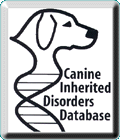
Protein-losing enteropathy
Excessive loss of plasma and proteins into the gastrointestinal (GI) tract is called protein-losing enteropathy. It can result from any condition that damages the lining of the GI tract. Protein-losing enteropathies that are thought to have an inherited component include intestinal lymhangiectasia, immunoproliferative enteropathy , and protein-losing enteropathy and nephropathy in the soft-coated wheaten terrier. The latter condition is thought to be related to adverse food reactions, and there is also loss of protein from the kidney (see also familial renal disease).
The inheritance may be autosomal recessive.
Your dog may fail to gain weight or may progressively lose weight. The loss of protein into the bowel causes loss of fluid from the circulation into the limbs, the abdomen, or the chest. Your dog's legs and/or abdomen may appear swollen and he/she may have trouble breathing. There may be a chronic persistent or intermittent diarrhea due to the loss of protein, fluid and fat into the bowel. Loss of protein from the kidney will cause increased urination and drinking in your dog.
If your dog has the signs described above, your veterinarian will likely suspect one of the diseases that result in loss of proteins into the gut. Laboratory tests and an intestinal biopsy are necessary to diagnose the specific cause.
This condition can not be cured but it can generally be well-managed by you and your veterinarian. The major goal of therapy is to reduce the loss of proteins into the intestine, to restore normal protein levels in your dog. This is done through diet, and medication to reduce inflammation in the intestinal wall. An ideal diet for dogs with protein-losing enteropathy contains minimal fat, and an ample quantity of high-quality protein. There are commercial prescription diets available which fulfill these requirements, or your veterinarian can give you information to prepare a low-fat diet at home. In either case, you will need to supplement your dog's diet with fat-soluble vitamins, due to the poor absorption of fat that occurs with this condition.
Corticosteroids may help to reduce inflammation, and thereby reduce loss of protein and associated diarrhea.
Affected dogs should not be used for breeding. Given that the inheritance is thought to be autosomal recessive, parents (considered carriers) and siblings (suspect carriers) should not be used for breeding either.
FOR MORE INFORMATION ABOUT THIS DISORDER, PLEASE SEE YOUR VETERINARIAN.
Burrows, C.F., Batt, R.M., Sherding, R.G. 1995. Diseases of the small intestine. In S.J. Ettinger and E.C. Feldman (eds.) Textbook of Veterinary Internal Medicine. p. 1224-1225. W.B. Saunders Co., Toronto.
Williams, D.A. 1998 Protein-losing enteropathy Proc. 16th ACVIM Forum pp 419-421
- Disorder Type:

